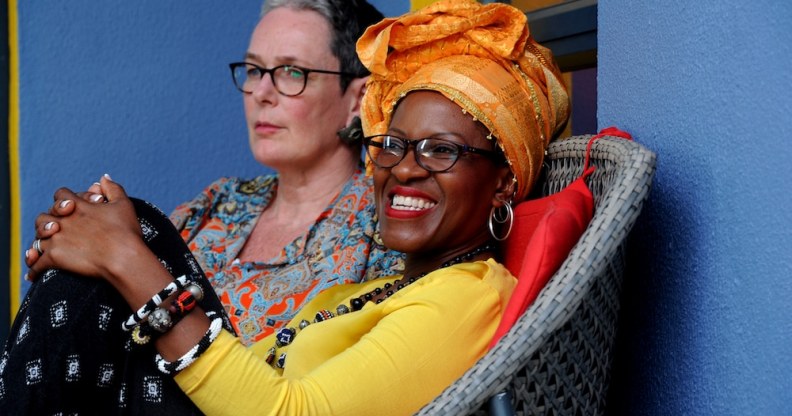Church of England bans Desmond Tutu’s lesbian daughter from presiding over godfather’s funeral

Mpho Tutu van Furth, daughter of the late archbishop Desmond Tutu, with her wife Marceline. (Getty/ Gallo Images/ Foto 24/ Lerato Maduna)
The Church of England has blocked Archbishop Desmond Tutu’s lesbian daughter, Mpho Tutu van Furth, from presiding over the funeral of a family friend.
Mpho Tutu van Furth is a South African Anglican priest, activist and daughter of the late Anglican archbishop, who lives with her wife in the Netherlands.
Her 92-year-old godfather Martin Kenyon’s final wish, reports VOA, was for Tutu van Furth to conduct his funeral.
But the Church of England told the lesbian priest that although it accepts same-sex couples, it would not allow her to preside over the funeral because she is married.
Her wife, Marceline Tutu van Furth, said: “She had to hand in her license and now this is the second time that I’m aware of, of course small things also happened, but that she can’t do something out of love for her godfather and for the family just because of the same-sex marriage and that’s something that upsets me.”
“She fell in love with me and then she had the courage to marry me and then she can’t be the person she is as a priest.”
Marceline said she was speaking out about the issue because she is determined to take action.
“The Tutu family has always been very welcoming to me,” she said.
“And Mpho [is] very polite and I thought now I’m going to make action. The Tutu family always have action and I thought, now it’s my turn.”
‘I oppose such injustice’
Mpho Tutu van Furth was ordained as an Anglican priest in 2003, but after marrying her Dutch wife she was barred from carrying out her duties in the church. The couple later moved to the Netherlands, where she is able to preach.
Her father, Desmond Tutu, was a Nobel Peace Prize laureate, anti-apartheid activist and staunch LGBTQ+ ally who died in December 2021.
In a video around a month before his death for the United Nations Free and Equal campaign, the UN’s “global campaign against homophobia and transphobia”, Tutu said: “I have to tell you, I cannot keep quiet when people are penalised for something about which they can do nothing.
“First, gender. When women are excluded, just simply and solely because they are women.
“But more perniciously, more ghastly, is the fact that people are penalised, killed, all sorts of ghastly things happen to them, simply, solely on the basis of their sexual orientation.
“I oppose such injustice with the same passion that I opposed apartheid.”

